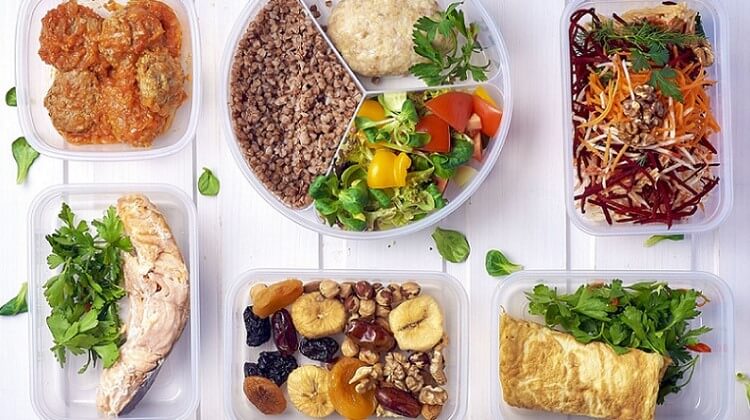Even though losing weight isn’t the solution to every health issue, you may want to consider it as the most important option, especially if you’re overweight or obese. You should follow your doctor’s advice when it comes to losing weight. However, for the best results in the long run, it is advised to lose between 1 and 2 pounds of weight per week.
But many weight-loss diets tend to leave you feeling hungry or deprived, or they may eliminate entire food groups that are necessary for healthy living and are therefore unsustainable.
Some people find success with weight loss by adhering to a low-carb diet, while others find success with a diet that prioritizes whole foods. It really all depends on the individual.
Nevertheless, here are some weight loss strategies backed by science, including eating healthy by choosing carbohydrates with care in order to…
- curb your hunger without leaving you feeling deprived
- induce long-term weight reduction that is stable
- help boost your metabolism.
Some of these suggestions may be helpful if you want to lose weight quickly, but keep in mind that rapid weight loss is rarely maintained. Long-term health benefits and maintaining healthy habits are more likely to lead to permanent weight loss.
3 Ways to Lose Weight Quickly
1. Reduce your consumption of processed foods.
Reducing your intake of carbohydrates (sugars and starches) can help you lose weight quickly. This could be accomplished by adhering to a low-carbohydrate diet or by swapping out refined carbs for whole grains.
If you do that, you’ll feel less hungry and consume fewer calories overall.
Low-carb diets encourage the use of fat stores as an alternative to carbs when providing energy.
Consuming more complex carbohydrates like high fiber whole grains, in addition to a calorie deficit, has the added benefit of ensuring that you digest these foods slowly. That’s why they’re so much healthier and guaranteed to keep you satisfied.
In 2020, researchers confirmed the effectiveness of a very low carbohydrate diet for age-related weight loss.
It has been hypothesized from studies that a low-carb diet can help curb hunger pangs and encourage a more mindful approach to calorie consumption. Keep in mind that studies on low-carbohydrate diets’ long-term effects are still in their early stages.
Also, note that low-carb diets can be hard to stick to, which can lead to weight cycling and less success in the long run.
A low-carb diet may not be the best choice if you want to lose weight because of the risks involved. Weight loss is possible even on low-calorie diets, which are also more manageable over the long term.
A 2019 study found a correlation between a high intake of whole grains and a lower BMI in people who followed a diet that prioritized whole grains over refined carbohydrates.
Don’t forget to speak with your doctor to find out his or her opinion on the best way for you to shed those extra pounds.

2. Take in some healthy fats and meat along with your greens.
It’s important to eat a variety of foods at each meal.
In order to keep your plate from looking too empty and to aid in your weight loss efforts, try consuming the following foods:
• protein
• healthy fats
• vegetables
• complex carbs, like those found in whole grains, but in moderation
- Protein
To keep your health and muscle mass intact while dieting, it’s crucial to consume the daily recommended amount of protein.
There is some evidence that getting enough protein can help with appetite control, weight maintenance, and other cardiometabolic risk factors.
Protein needs are highly variable, but in general, men require 56 to 91 grams per day and women require 46 to 75 grams per day.
Here are some recommendations to help you determine a healthy protein intake:
• Weight-based Dose of 0.8 g/kg
• The recommended dosage for adults over the age of 65 is between 1.1 and 1.2 g/kg.
• 1.4-2 g/kg for athletes
It has been suggested that diets high in protein can help people feel full and satisfied, thereby decreasing their desire for unhealthy snacks.
These are some examples of protein-rich foods that are healthy for you:
• Meats including chicken, lamb, pork and beef
• Seafood and fish like shrimps, sardines, trout, salmon, and trout
• eggs
• Plant-based protein, such as; legumes, beans, tofu, tempeh and quinoa.
- Vegetables
Don’t be shy about piling on the leafy greens. You can eat a lot of them without significantly increasing your calorie intake or your blood sugar level because they are so nutrient dense.
All vegetables are great for you, but those that are higher in carbohydrates include corn, winter squash, sweet potatoes, and Irish potatoes.
These vegetables count as complex carbohydrates because of the fiber they contain, but you should still watch how much of them you eat.
Don’t shy away from extra servings of these vegetables:
• broccoli
• cabbage
• cauliflower
• Chard Swiss
• Cruciferous vegetable known as Brussels sprouts
• cucumber
• kale
• lettuce
• peppers
• spinach
• tomatoes
- Nutritious Fats
You shouldn’t be afraid of eating healthy fats.
No matter which diet you choose, healthy fats are a necessity for your body. Oils extracted from avocados and olives are both healthy additions to any diet. You can also add some healthy and tasty seeds, nuts, avocados and olives to your salad.
Note that because of the higher saturated fat content of fats like coconut oil and butter, these types of fats should only be used sparingly.
IN SUMMARY:
It’s recommended that you include complex carbs, protein, vegetables and healthy fat in each meal.
Leafy green vegetables are a healthy and low-calorie way to increase the volume of a meal.
3. Maintain an active lifestyle
Daily exercise is essential to helping you lose weight quickly. The advantages of weightlifting are especially noteworthy.
Weight training is a great way to burn calories and keep your metabolism revved up, even as you shed pounds.
You should try doing strength training at least thrice per week. A trainer can be helpful if you’re new to weightlifting. Get your doctor’s approval before beginning any new exercise routine.
Cardio exercises, such as; walking, jogging, running, cycling, and swimming, are excellent for weight loss and general health if weight lifting is out of the question.
Cardiovascular exercise and weight training both have the potential to aid in weight loss and provide numerous additional health benefits.
IN SUMMARY:
Weightlifting and other forms of resistance training are effective means of weight loss. If that isn’t an option, cardio exercises will produce similar results.

Calorie counting and portion control
By restricting your carb intake and focusing instead on low-carb veggies, protein and fat, you can successfully follow a low-carb diet without worrying about calorie counting.
Keeping track of your caloric intake can help you determine if this is the cause of your weight loss stall.
An online calorie calculator is a great resource for people who are trying to lose weight by maintaining a calorie deficit.
Please keep in mind that it is possible to harm yourself and be less effective at losing weight if you eat less than required portions of calories. Aim for a healthy and manageable calorie deficit, as advised by your doctor.
A Word About Calories
Calorie counting could be a useful strategy for some people, but it’s not necessarily the best option for everyone.
It’s important to seek help if you find yourself constantly thinking about food or your weight, struggling with feelings of guilt over the food you eat, or engaging in restrictive diets on a regular basis. Having an unhealthy relationship with food or an eating disorder may be reflected in these actions.
If you’re having trouble, it’s important to consult a medical expert, such as a registered dietitian.
The National Eating Disorders Association offers a toll-free helpline where you can talk to a trained volunteer in complete anonymity. They also offer a wealth of informational materials that are either free-of-charge or quite inexpensive.
IN SUMMARY:
It is not necessary to count calories when following a low carb diet plan. However, counting calories can be useful if you’re having trouble losing weight despite following a low-calorie diet.
Tips for Weight Loss
If you’re trying to trim down, consider these tips for weight loss today:
- Maintain your muscle mass by starting the day with a protein-rich meal: A high-protein breakfast may lessen the need for snacking and the number of calories consumed later on.
- Cut down on soda and fruit juice: The calories obtained from sugar can be counterproductive to your weight loss efforts because they provide no nutritional value.
- Keep your fluid levels up: Try to consume half your body weight in ounces of water every day.
- Eat foods that help you lose weight: When trying to lose weight, there are certain foods that work better than others. Foods that aid in weight loss are listed below.
- Eat more fiber: Studies show that eating fiber may promote weight loss. You can get your daily dose of fiber by eating foods like seeds, nuts, whole grains, vegetables and fruits.
- Drink coffee or tea: Caffeine consumption may help boost your metabolism. No need to go overboard on caffeine though and be mindful of adding sugar to these drinks.
- Base your diet on whole foods: They tend to be nutrient rich, more filling, and less likely to cause overeating than refined or processed foods.
- Eat slowly: Eating quickly can lead to weight gain over time, while eating slowly makes you feel more full and boosts weight-reducing hormones.
- Get good quality sleep: Sleep is important for many reasons, and poor sleep is one of the biggest risk factors for weight gain.
While these tips for weight loss are a good starting point, they’re not the only things that impact weight loss. Try to reduce stress, and live an active lifestyle rather than a sedentary one.
IN SUMMARY:
Eating less sugar and more whole foods, fiber, and protein can help you lose more weight. Don’t forget to get a good night’s sleep as well.
Weight Loss Meal Plans
The sample meal plan ideas in this post are low in carbs with a daily carb limit of between 20 and 50 carbs per day. Each meal should consist of veggies, healthy fats and protein. Note that these meal ideas are just suggestions, as everyone has different needs and food preferences.
If you’d prefer to lose weight while still eating complex carbs, add in some healthy whole grains to your meals such as:
- barley
- brown rice
- oatmeal
- quinoa
- rye
- whole wheat bread, pasta or flour
Breakfast meal ideas
- unsweetened Greek yogurt with almonds and berries
- poached egg with a side of berries and sliced avocado
- green smoothie with nut milk, spinach, avocado and a side of cottage cheese
- feta crustless quiche, mushrooms and spinach
Lunch meal ideas
- BLT wrap with peanut butter and celery sticks
- smoked salmon with avocado and a side of broccoli and asparagus
- kale and spinach salad with guacamole, chickpeas and grilled tofu
- lettuce wrap with grilled turkey or chicken, salsa, red pepper and black beans
Dinner meal ideas
- salmon baked with roasted zucchini, sesame oil, and ginger
- enchilada salad with chicken, avocado, mango, spices and peppers
- antipasto salad with olive oil, asparagus, white beans, parmesan, and cucumbers
- ground turkey bake with cheese, pepper, onions and mushrooms
- roasted cauliflower with pine nuts, Brussels sprouts, and tempeh
Snack ideas
- strawberries and brie
- cauliflower, hummus and veggies
- kale chips
- healthy homemade trail mix with nuts and dried fruit
- tuna pouches
- cottage cheese with cinnamon and flaxseeds
- roasted pumpkin seeds
- spicy roasted chickpeas
- steamed edamame

How Fast Can You Lose Fat?
You may lose weight more quickly in the first week of a diet plan and then lose weight at a slower, but more consistent rate after that. In the first week you typically lose a mix of both body fat and water weight.
If this is the first time you are making changes to your diet and exercise habits, weight loss may happen more quickly.
Unless your doctor suggests otherwise, losing 1 to 2 pounds per week is usually a safe amount of weight to lose. If you’re trying to lose weight faster than that, speak to your doctor about a safe level of calorie reduction.
Aside from weight loss, a low carb diet can improve your health in a few ways, though the long-term effects are not yet known:
- blood pressure improves significantly
- blood sugar levels tend to significantly decrease on low carb diets
- LDL (bad) cholesterol goes down
- triglycerides tend to go down as well
Other diet types that reduce calories and increase whole foods are also associated with improved metabolic markers and slower aging. Ultimately, you may find a more balanced diet that includes complex carbohydrates is more sustainable.
IN SUMMARY:
You can reach your weight loss goals by incorporating a low carb or low calorie diet into your life, but the speed of weight loss depends on the individual.
In Conclusion
By reducing carbs or replacing refined carbs with complex carbs, you’ll likely experience reduced hunger levels. Feeling hungry is often why it’s difficult to maintain a weight loss plan, so it’s important to find a way of eating that leaves you feeling satisfied.
By incorporating a sustainable low carb or lower calorie eating plan, you can eat healthy food until you’re full and still lose weight.
Losing weight quickly may be your goal, but it’s important to think about the long-term effects. While you may lose water weight quickly, fat loss takes longer, and developing sustainable weight loss may take longer than you’d like.


